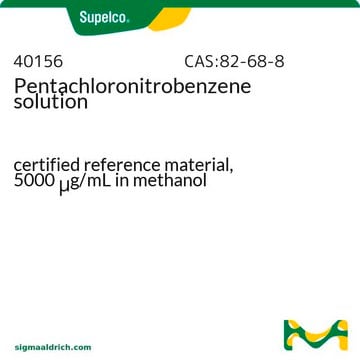P2205
Pentachloronitrobenzene
≥94%
Synonyme(s) :
PCNB, Quintozène
About This Item
Produits recommandés
Niveau de qualité
Essai
≥94%
95%
Pf
140-143 °C (lit.)
Chaîne SMILES
[O-][N+](=O)c1c(Cl)c(Cl)c(Cl)c(Cl)c1Cl
InChI
1S/C6Cl5NO2/c7-1-2(8)4(10)6(12(13)14)5(11)3(1)9
Clé InChI
LKPLKUMXSAEKID-UHFFFAOYSA-N
Vous recherchez des produits similaires ? Visite Guide de comparaison des produits
Catégories apparentées
Application
<li><strong>Pentachloronitrobenzene Environmental Impact:</strong> Pentachloronitrobenzene (PCNB) is an organochlorine fungicide widely used for seed and soil treatments to control various fungal pathogens and also disrupts murine ventricular wall development by inhibiting cardiomyocyte proliferation, highlighting its significant biological impact and raising concerns about its environmental safety (Gao et al., 2024).</li>
</ul>
Mention d'avertissement
Warning
Mentions de danger
Conseils de prudence
Classification des risques
Acute Tox. 4 Oral - Aquatic Acute 1 - Aquatic Chronic 1 - Skin Sens. 1
Code de la classe de stockage
11 - Combustible Solids
Classe de danger pour l'eau (WGK)
WGK 2
Point d'éclair (°F)
Not applicable
Point d'éclair (°C)
Not applicable
Équipement de protection individuelle
dust mask type N95 (US), Eyeshields, Faceshields, Gloves
Faites votre choix parmi les versions les plus récentes :
Certificats d'analyse (COA)
Vous ne trouvez pas la bonne version ?
Si vous avez besoin d'une version particulière, vous pouvez rechercher un certificat spécifique par le numéro de lot.
Déjà en possession de ce produit ?
Retrouvez la documentation relative aux produits que vous avez récemment achetés dans la Bibliothèque de documents.
Les clients ont également consulté
Notre équipe de scientifiques dispose d'une expérience dans tous les secteurs de la recherche, notamment en sciences de la vie, science des matériaux, synthèse chimique, chromatographie, analyse et dans de nombreux autres domaines..
Contacter notre Service technique











